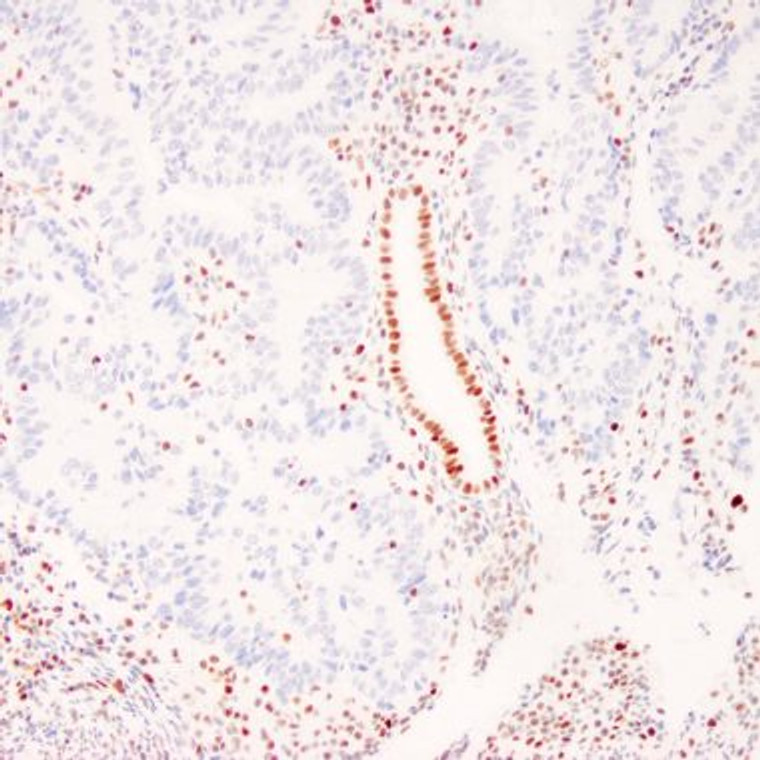| Host: |
Mouse |
| Applications: |
IHC-P |
| Reactivity: |
Human |
| Note: |
STRICTLY FOR FURTHER SCIENTIFIC RESEARCH USE ONLY (RUO). MUST NOT TO BE USED IN DIAGNOSTIC OR THERAPEUTIC APPLICATIONS. |
| Short Description: |
Mouse monoclonal antibody anti-MLH1 (Full length) is suitable for use in Immunohistochemistry research applications. |
| Clonality: |
Monoclonal |
| Clone ID: |
G168‐728 |
| Conjugation: |
Unconjugated |
| Isotype: |
IgG1/Kappa |
| Formulation: |
Tris-HCI buffer containing stabilizing protein (BSA) and <0.1% ProClin |
| Purification: |
Affinity purified |
| Dilution Range: |
1:25‐100 |
| Storage Instruction: |
Store at 2‐8°C for up to 24 months. Predilute: Ready to use, no reconstitution necessary. Concentrate: Use dilution range and appropriate lab‐standardized diluent. Stability after dilution: 7 days at 24°C, 3 months at 2‐8°C, 6months at ‐20°C. |
| Gene Symbol: |
MLH1 |
| Gene ID: |
4292 |
| Uniprot ID: |
MLH1_HUMAN |
| Immunogen Region: |
Full length |
| Specificity: |
Positive control: Colon carcinoma |
| Immunogen: |
Full length recombinant MLH-1 |
| Tissue Specificity | Colon, lymphocytes, breast, lung, spleen, testis, prostate, thyroid, gall bladder and heart. |
| Function | Heterodimerizes with PMS2 to form MutL alpha, a component of the post-replicative DNA mismatch repair system (MMR). DNA repair is initiated by MutS alpha (MSH2-MSH6) or MutS beta (MSH2-MSH3) binding to a dsDNA mismatch, then MutL alpha is recruited to the heteroduplex. Assembly of the MutL-MutS-heteroduplex ternary complex in presence of RFC and PCNA is sufficient to activate endonuclease activity of PMS2. It introduces single-strand breaks near the mismatch and thus generates new entry points for the exonuclease EXO1 to degrade the strand containing the mismatch. DNA methylation would prevent cleavage and therefore assure that only the newly mutated DNA strand is going to be corrected. MutL alpha (MLH1-PMS2) interacts physically with the clamp loader subunits of DNA polymerase III, suggesting that it may play a role to recruit the DNA polymerase III to the site of the MMR. Also implicated in DNA damage signaling, a process which induces cell cycle arrest and can lead to apoptosis in case of major DNA damages. Heterodimerizes with MLH3 to form MutL gamma which plays a role in meiosis. |
| Protein Name | Dna Mismatch Repair Protein Mlh1Mutl Protein Homolog 1 |
| Database Links | Reactome: R-HSA-5358565Reactome: R-HSA-5358606Reactome: R-HSA-5545483Reactome: R-HSA-5632987Reactome: R-HSA-6796648Reactome: R-HSA-912446 |
| Cellular Localisation | NucleusChromosomeRecruited To Chromatin In A Mcm9-Dependent Manner |
| Alternative Antibody Names | Anti-Dna Mismatch Repair Protein Mlh1 antibodyAnti-Mutl Protein Homolog 1 antibodyAnti-MLH1 antibodyAnti-COCA2 antibody |
Information sourced from Uniprot.org
12 months for antibodies. 6 months for ELISA Kits. Please see website T&Cs for further guidance




![Anti-MLH1 antibody [G168-728] (STJ16100394) Anti-MLH1 antibody [G168-728] (STJ16100394)](https://cdn11.bigcommerce.com/s-zso2xnchw9/images/stencil/300x300/products/149111/346732/STJ16100394_1__48360.1681998822.jpg?c=1)

